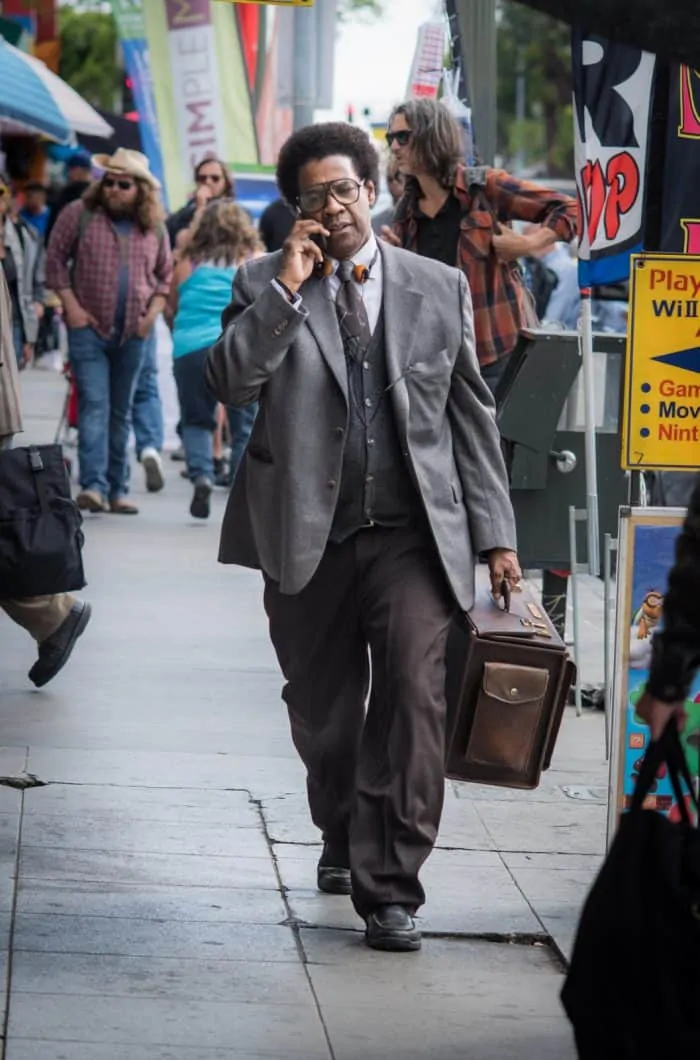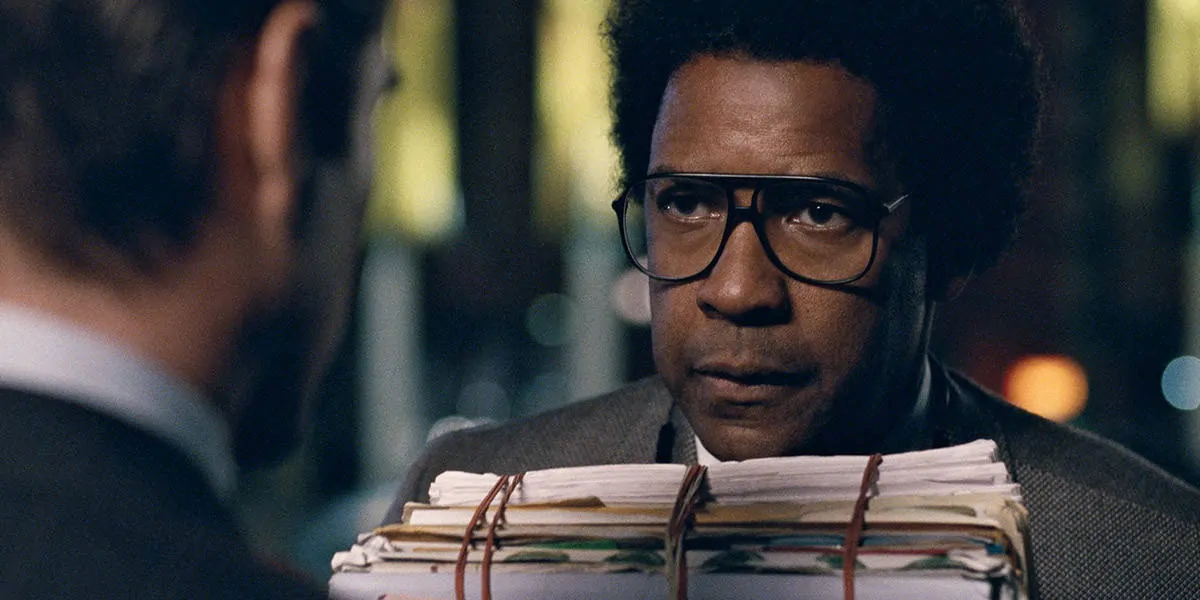Director and writer Dan Gilroy has said he created the part of attorney Roman J. Israel with Denzel Washington specifically in mind: “There was only one person who can play the part. I literally wrote it for him.”
This film was shown at the Toronto International Film Festival and then re-edited by Denzel Washington and Dan Gilroy after initial critical feedback was lukewarm. The film shown weeks later at the New Orleans Film Festival was tighter and 12 minutes shorter, a different film.
Denzel’s character portrait is memorable and probably the most challenging part in his long acting career.
Denzel’s character portrait is memorable and probably the most challenging part in his long acting career. A brilliant attorney, Roman J. is shy, awkward, and firmly anchored to a political past with greater heroes like Bayard Rustin and more exciting popular music than he experiences in the streets of Los Angeles now. He walks around the city and rides public transit with a hugh briefcase at his side, wearing old-fashioned headphones featuring music from American’s golden ages of jazz and rock. Most likely Roman’s astounding memory and diamond-edged recall of legal matters, as well as his seemingly eccentric behavior, put him in the middle of the autism syndrome. His jars of peanut butter are lined up neatly on the kitchen counter; he seems to subsist on peanut butter sandwiches, eaten while standing.
Avoiding cinematic clichés often used to portray individuals with impaired communication skills, Denzel effectively creates a man confronting a frightening new reality when his business partner and mentor William Henry Jackson Esq. dies suddenly. Jackson was front office; he represented clients in the courtroom. Roman was back office, researching each case until it was air tight. Full of trepidation, Roman forges ahead with his new responsibilities. However, Roman is much too direct in talking with prison guards at the jail facility where his clients sit waiting for representation, with judges in the courtroom and with the district attorney’s office where he has to go for plea bargaining. After receiving his first contempt citation and a $5,000 fine, he has to rethink his initial opposition to working with the slick uptown George Pierce, Esq. (Colin Farrell), who also was mentored by Jackson
What fascinates in this film is Denzel’s deeply drawn portrait of a man who has functioned brilliantly in the nurturing atmosphere of his mentor’s law firm. Now he has to take his bumbling walk, hopelessly outdated Afro hairdo, and last-century clothes into the world of corporate law.
Colin Farrell is excellent as George Pierce, who entered law school as a young cynic but who was affected deeply by William Henry Jackson’s class lectures and his philosophy toward the practice of law. Flashy and self-assured, he prepares to dismiss Roman J. after Jackson’s death, but finds he cannot. And in time as they spar over client cases and legal philosophy, they develop an understanding.
A shout-out to cinematographer Robert Elswit, who is best known for work on Boogie Nights (1997), There Will Be Blood (2007), Michael Clayton (2007), and Nightcrawler (2014). His images of Los Angeles neighborhoods in the daylight and by night are striking. I especially like the scene where Roman J. has decided to do something not strictly ethical and so looks for a working pay phone booth so he can make an anonymous call. Fliptop phone securely in his pocket, he has to look in one abandoned phone booth after another in a blue-collar neighborhood before he is successful, illustrating one of the many changes in the 40 years of his legal career.
Supporting roles are filled nicely by Carmen Ejogo as activist Maya Alston, who sees something in Roman J. which warms her heart; Amanda Warren as Lynn Jackson, daughter of the late William Henry Jackson, Esq.; and Lynda Gravatt as Vernita Wells, Jackson’s secretary who sits by his hospital bed when he is in a coma. Brilliant jazz musician Esperanza Spalding makes a surprise appearance as a contemporary political activist at a meeting where Roman J. is speaking.

The practice of law has consequences, as we all know from watching Paul Newman, Tom Cruise and a host of other actors struggle with their consciences in film after film. The strong mentorship of an attorney we never see has a profound impact on Roman J. and George Pierce, as they struggle with what is realistic in their chosen field, as well as what is absolutely necessary for the human spirit.
The practice of law has consequences, as we all know from watching Paul Newman, Tom Cruise and a host of other actors struggle with their consciences in film after film.
Roman J. is asked what “Esq.” stands for. He says, a little above being a gentleman and a little below knighthood. And you find yourself going with him, this fierce romantic dreamer who says things like, “it’s an enema of sunshine” and “hope don’t get the job done;” and who is described by someone as “I can always count on you to say the utterly inappropriate thing.”
Laughter, surprise, shock, excitement and hope all play a part in this film. And don’t forget the classic soundtrack ranging from Duke Ellington and Pharoah Sanders to George Clinton Jr. and Marvin Gaye. And throw in The Chambers Brothers and The Spinners as well.



